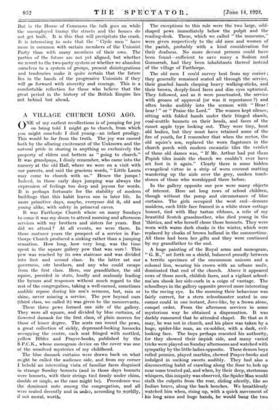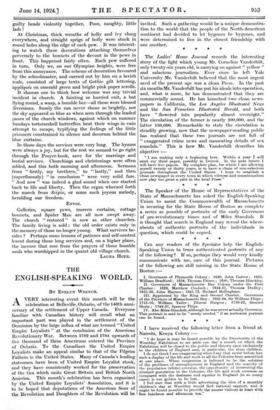A VILLAGE CHURCH LONG AGO.
ONE of my earliest recollections is of jumping for joy . on being told I might go to church, from which you might conclude I died young—an infant prodigy. This would be far from the truth. The joy was caused both by the alluring excitement of the Unknown and the natural pride in sharing in anything so exclusively the property of elders and betters as "going to church." It was grandpapa, I dimly remember, who came into the nursery at the old Hall, where we were on a visit with our parents, and said the gracious words, "Little Laura may come to church with us." Hence the jumps ! Indeed, in those early days ,jumping was always the expression of feelings too deep and joyous for words. It is perhaps fortunate for the stability of modern 'buildings that this habit leaves one in later life. In more primitive days, maybe, everyone did it, old and young alike, with safety in primeval eaves.
It was Farthorpe Church where on many Sundays to conic it was my doom to attend morning and afternoon- services with my brothers and sisters for years. But .did we attend ? At all events, we were there. In those maturer years the prospect of a service in Far- thorpe Church produced a sinking rather than a jumping sensation. How long, how very long, was the time spent in the square gallery pew that was ours !- This pew was reached by its own staircase and was divided into first and second class. In the latter sat our governess, calr brothers, and any who could escape from the first class. Here, our grandfather, the old squire, presided in state, loudly and zealously leading the hymns and responses without much regard to the rest of the congregation, taking a well-earned, sometimes audible repose during his son's sermons, but, rain or _ shine, never missing a service. The pew beyond ours - (third class, we called it) was given to the menservants.
.These three pews formed, one side of the gallery. They were all square, and divided by blue curtains, of flowered damask for the first, class, of plain moreen for those of lesser degree. The seats ran round the pews, a great collection of sickly, depressed-looking hassocks occupying the centre, each seat fringed with mottled, yellow Bibles and Prayer-books, published by the S P.C.K., whose monogram device on the cover was one of the unsolved mysteries of my childhood.
The blue damask chitains Were drawn back on what m4ht be called the audience side, and from my corner I beheld an interesting vista of familiar fazes disguised in strange Sunday bonnets (and in those days bonnets were bonnets, with their strings tied firmly under chins, double or single, as the case might be). Precedence was • the dominant note among the congregation, and all were Seated decently and in order, ding t ldl according o wro y, if not moral, worth* The -exceptions to this ride were the two large,' odd- shaped pews immediately below the pulpit and the reading-desk. These, which we _called "'the' museums," were given respectively, to the old Men' and women of the parish,, probably with , a kind consideration for their deafness. No more devout persons could have been found—sufficient to save many a Sodom and Gomorrah, had they' been inhabitants thereof instead of the village of FaithOrpe. .
The old men I could survey best from my corner.; they generally remained seated. _all through the service, their gnarled hands, clasping heavy .walking-sticks, and their brown, deeplyed faces and dim eyes upturned. They followed, and as it were punctuated, the service with groans of approval (or was it repentance ?) and often broke audibly into the sermon. with " Hear ! hear ! "or " Praise the Lord." The women kept silence, sitting with folded hands under, their fringed shawls, coal-scuttle bonnets on their heads, .and faces of the russet apple type looking out. They were tiny, bent old bodies, but they must have retained some 4. the fire of youth, for I remember that when the rector, the old squire's son, replaced the worn flagstones in the church porch with modern encaustic tiles the verdict of these , old dames was, "If Mr., Arthur had put them Popish tiles inside the church we couldn't. ever have set foot in it again." Clearly there is, some hidden evangelical virtue in a strip of worn coconut matting wandering up the aisle OVer the grey, sunken tomb- stones of those who worshipped there before.
In the gallery, opposite our pew were many objects of interest. Here sat long rows, of school children, though without the pomp and circumstance of blue curtains. The girls occupied the west end—demure maidens, each little face framed in a white straw cottage bonnet, tied with Hay tartan ribbons, a relic of my beautiful Scotch grandmother, who died young in the 'thirties, and who herself chose those bonnets. They were worn with warm dark cloaks in the winter, which were replaced by cloaks of brown holland in the summertime. All these had been her gifts and they were, continued by my grandfather to the end.
A huge painting of the Royal arms and monogram, "G. R.," set forth on a shield, balanced proudly between a terrific specimen of the uncommon unicorn and a colossal lion, wearing his crown with an urbane smile, dominated that end of the church. Above it appeared rows Of those meek, childish faces, and a vigilant school- ma'am shook her side-curls in a coign of vantage. The schoolboys in the gallery opposite proved more interesting to the roving eye. In the 'morning their behaviour was fairly correct, for a stern schoolmaster, seated in one corner could in one instant, Jove-like, by a frown alone, compel order. From the afternoon services in some mysterious way he obtained a dispensation. It was darkly rumoured that he attended chapel. Be that as it may, he was not in church, and his place was taken by a huge, spider-like man, an ex-soldier, with a dark, evil- looking face.. The boys perhaps resented his authority, for they showed their impish side, and many varied tricks were played on Sunday afternoons and watched with sympathy by the little ladies opposite. These demon boys rolled pennies, played _marbles, chewed Prayer-books and indulged in sucking ,sweets audibly. They had also a disconcerting habit of crawling along the _floor to bob up near some trusted pal, and when, by their deep, stertorous whispers, this iniquity was observed, the Spider Man would stalk the culprits from the rear, sliding silently, like an Indian brave, along the back benches. We breathlessly watched him when, rising up, with a quick movement of his long arms and huge hands, he would bang the two guilty heads violently together. Poor, naughty, little lads !
At Christms, thick wreaths of holly and ivy dung . . . everywhere, and straight sprigs of holly were stuck in round holes along the edge of each pew. It was interest- ing to watch these decorations attaching themselves perversely to the bonnets of the devout in the pews in front. This happened fairly often. Each pew suffered in turn. Only we, on our Olympian heights, were free from this annoyance. The scheme of decoration favoured by the schoolmaster, and carried out by him on a lavish scale, consisted of large texts of Gothic gilt lettering, , .appliqués on emerald green and bright pink paper scrolls.
It shames one to think how welcome was any trivial incident in 'church. A fainting or hurried exit, a bat flying round, a wasp, a bumble bee—all these were blessed diversions. Surely the sun never shone so brightly, nor the sky appeared so blue as when seen through the leaded panes of the church windows, against which on summer Sundays tortoiseshell butterflies beat their wings in vain attempt to escape, typifying the feelings of the little prisoners constrained to silence and decorum behind the blue 'curtains.
In those days the services were very long. The hymns were always a joy, but for the rest we seemed to go right through the Prayer-book, save for the marriage and burial services. Churchings and christenings were often added, and this both morning and afternoon. Sermons from "firstly, my brethren," to "lastly,"' and then (superfluously) "in conclusion" were very solid fare. "And now" was indeed a glad sound when one started back to life and liberty. Then the organ wheezed forth the march from Scipio, or some such joyous melody, heralding our freedom.
ENVOI.
Galleries, square pews, moreen curtains, cottage bonnets, and Spider Man are 'all now swept away. The chureh " restored " is now as other churches. The family living is sold ; the old order exists only in the memory of those no longer young: Whit survives be- sides ? Perhaps some lessons of patience and self-control learnt during those long services and, on a higher plane, the incense that rose from the prayers of those humble souls who worshipped in the quaint old village church.
LAURA HOPE.











































 Previous page
Previous page